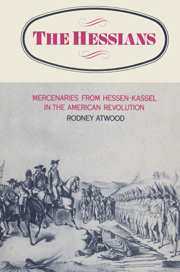Book contents
- Frontmatter
- Contents
- List of maps
- Acknowledgements
- Abbreviations
- Note on German ranks and currency
- Introduction
- 1 The German soldier trade
- 2 The Hessians go to America
- 3 The victories of 1776
- 4 The Battle of Trenton
- 5 The campaigns of 1777–81
- 6 Anglo-Hessian relations
- 7 The Hessian view of the American Revolution
- 8 Hessian plundering
- 9 Hessian desertion
- 10 Recruiting in Germany
- 11 The impact of the war on Hessen
- 12 Conclusion
- Appendices
- Bibliography
- Index
- Frontmatter
- Contents
- List of maps
- Acknowledgements
- Abbreviations
- Note on German ranks and currency
- Introduction
- 1 The German soldier trade
- 2 The Hessians go to America
- 3 The victories of 1776
- 4 The Battle of Trenton
- 5 The campaigns of 1777–81
- 6 Anglo-Hessian relations
- 7 The Hessian view of the American Revolution
- 8 Hessian plundering
- 9 Hessian desertion
- 10 Recruiting in Germany
- 11 The impact of the war on Hessen
- 12 Conclusion
- Appendices
- Bibliography
- Index
Summary
The Hessians have long been regarded as villainous plunderers in the American War of Independence. Reared in traditions of pillage and rapine going back to the Thirty Years War, they came to America, it was asserted, expecting to find a land of immense wealth where they could make their fortunes at the expense of the inhabitants. Ignorant and brutal, not speaking the language, they could not distinguish between friend and foe, and plundered indiscriminately. John Almon's Remembrancer spoke of ‘the infamous habit of plundering, begun first by the Hessians … mentioned in every letter from America’; American newspapers published accounts, not merely of Hessian plundering, but of the rape of farmers’ daughters and the desolation of their homes. Fear and detestation of the mercenaries was increased by the newspapers printing affidavits attesting to every misdeed, assiduously collected by rebel committees. Letters described the inability of the British to restrain their auxiliaries and of a German greed for plunder so strong that it brought them to blows with their allies. Thus, when Hessian grenadiers entered Philadelphia with Cornwallis's vanguard in October 1777, one observer shrank with horror:
The Hessians composed a part of the van-guard, and followed in the rear of the British grenadiers – their looks to me were terrific – their brass caps – their mustaches – their countenances, by nature morose, and their music, that sounded better English that they themselves could speak – plunder – plunder – plunder – plunder – gave a desponding, heart-breaking effect, as I thought to all; to me it was dreadful beyond expression.
- Type
- Chapter
- Information
- The Hessians , pp. 171 - 183Publisher: Cambridge University PressPrint publication year: 1980

